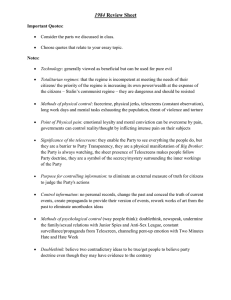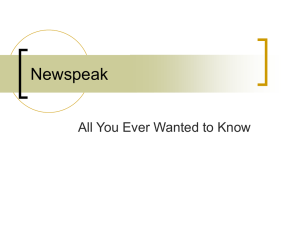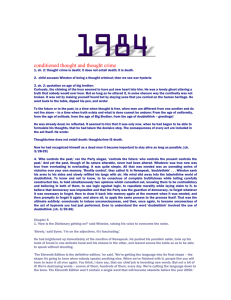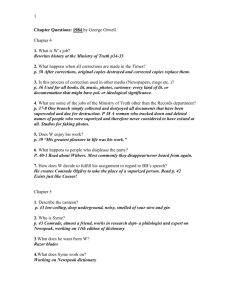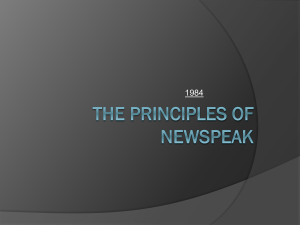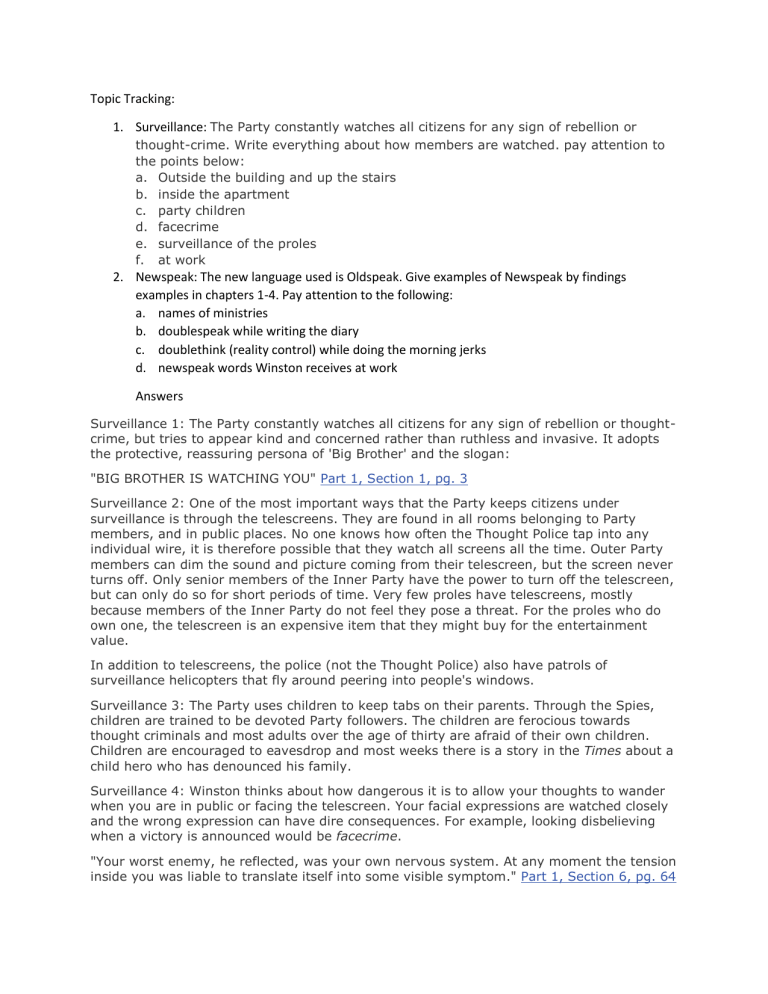
Topic Tracking: 1. Surveillance: The Party constantly watches all citizens for any sign of rebellion or thought-crime. Write everything about how members are watched. pay attention to the points below: a. Outside the building and up the stairs b. inside the apartment c. party children d. facecrime e. surveillance of the proles f. at work 2. Newspeak: The new language used is Oldspeak. Give examples of Newspeak by findings examples in chapters 1-4. Pay attention to the following: a. names of ministries b. doublespeak while writing the diary c. doublethink (reality control) while doing the morning jerks d. newspeak words Winston receives at work Answers Surveillance 1: The Party constantly watches all citizens for any sign of rebellion or thoughtcrime, but tries to appear kind and concerned rather than ruthless and invasive. It adopts the protective, reassuring persona of 'Big Brother' and the slogan: "BIG BROTHER IS WATCHING YOU" Part 1, Section 1, pg. 3 Surveillance 2: One of the most important ways that the Party keeps citizens under surveillance is through the telescreens. They are found in all rooms belonging to Party members, and in public places. No one knows how often the Thought Police tap into any individual wire, it is therefore possible that they watch all screens all the time. Outer Party members can dim the sound and picture coming from their telescreen, but the screen never turns off. Only senior members of the Inner Party have the power to turn off the telescreen, but can only do so for short periods of time. Very few proles have telescreens, mostly because members of the Inner Party do not feel they pose a threat. For the proles who do own one, the telescreen is an expensive item that they might buy for the entertainment value. In addition to telescreens, the police (not the Thought Police) also have patrols of surveillance helicopters that fly around peering into people's windows. Surveillance 3: The Party uses children to keep tabs on their parents. Through the Spies, children are trained to be devoted Party followers. The children are ferocious towards thought criminals and most adults over the age of thirty are afraid of their own children. Children are encouraged to eavesdrop and most weeks there is a story in the Times about a child hero who has denounced his family. Surveillance 4: Winston thinks about how dangerous it is to allow your thoughts to wander when you are in public or facing the telescreen. Your facial expressions are watched closely and the wrong expression can have dire consequences. For example, looking disbelieving when a victory is announced would be facecrime. "Your worst enemy, he reflected, was your own nervous system. At any moment the tension inside you was liable to translate itself into some visible symptom." Part 1, Section 6, pg. 64 Newspeak 1: In Newspeak, the official language of Oceania, the Ministries are referred to as "minis:" the Ministries of Love, Peace, Plenty and Truth are "Miniluv," "Minipax," "Miniplenty," and "Minitrue." Newspeak 2: As Winston wonders for whom he is writing the diary, the Newspeak word "doublethink" comes to mind. He realizes that it is impossible for him to communicate with the future. The status quo will continue and no one will listen, or society will be completely different, and no one will care about his problems. Even so, he is attempting to communicate his thoughts to the future. This is an example of doublethink. Newspeak 3: During "Physical Jerks," Winston thinks again about the idea of "doublethink," or in Oldspeak, "reality control." It means to be able to think two contradictory things at once without being aware of the contradiction. In other words, one is conscious of telling the truth while telling lies, forgetting whatever one needs to forget and then remembering it when needed, only to forget again. Doublethink is essential for political orthodoxy. Newspeak 4: The Ministry of Truth uses a jargon constructed mainly out of Newspeak words for sending memos to employees. Winston also has to use Newspeak when working on leading articles for the Times, all of which are written entirely in Newspeak. For this he uses his Newspeak dictionary, the Ninth Edition.
